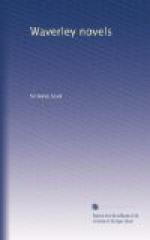|
This section contains 3,233 words (approx. 11 pages at 300 words per page) |

|
SOURCE: Smith, Louise Z. “Dialectic, Rhetoric, and Anthropology in Scott's Waverley.” Studies in Scottish Literature 21 (1986): 43-52.
In the following essay, Smith contends that Scott synthesized the modern historical novel in Waverley by grafting “dialectical rhetoric” and “anthropological historicism” to the existing elements of eighteenth-century fiction.
'Tis forty-eight years since Georg Lukács invented in The Historical Novel (1937) the definition of historical fiction for modern readers. Scott invented the “entirely new”1 historical novel, Waverley; or, 'Tis Sixty Years Since (1814) for Lukács. But who invented it for Scott? And what is the nature of his invention? I think Scott's invention combined the elements familiar in eighteenth-century fiction with two closely related, newer elements: dialectical rhetoric and anthropological historicism. Dialectical rhetoric presents the narrator's shifting vision—sometimes sympathetic, sometimes objective—of the past. This dual vision presents anthropological details—of language, genealogy, ceremony, legend, and local association—both as facts...
|
This section contains 3,233 words (approx. 11 pages at 300 words per page) |

|


